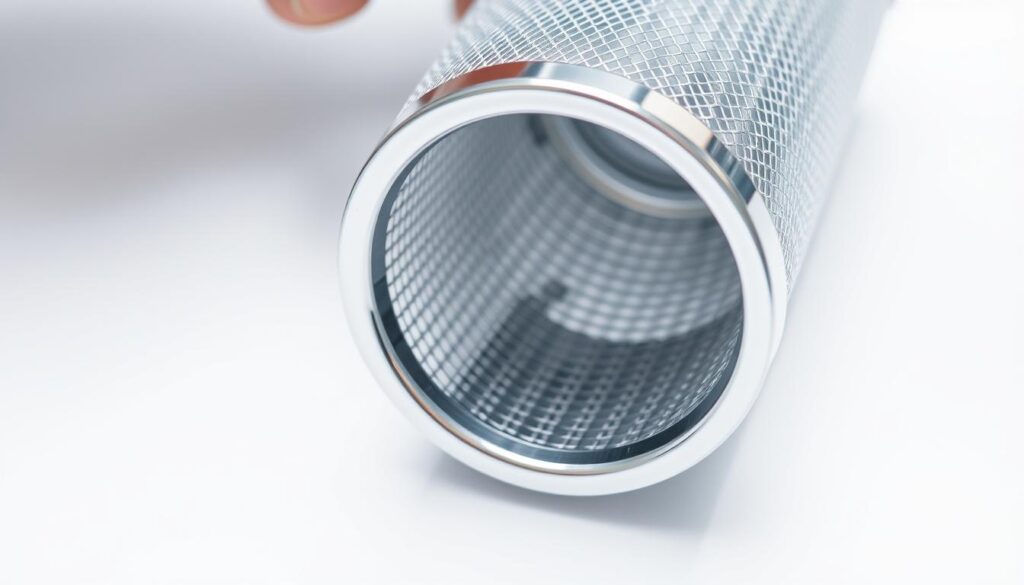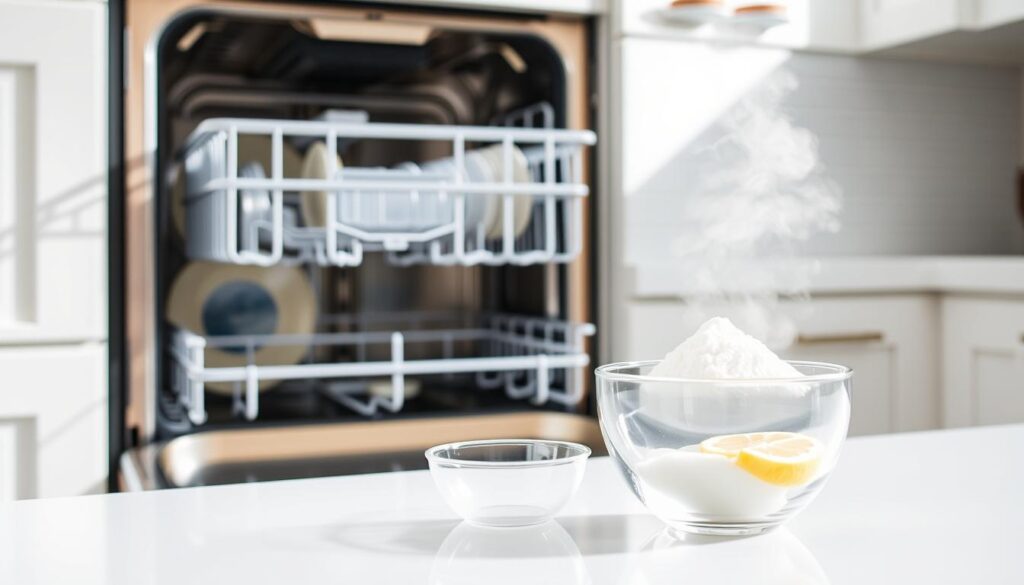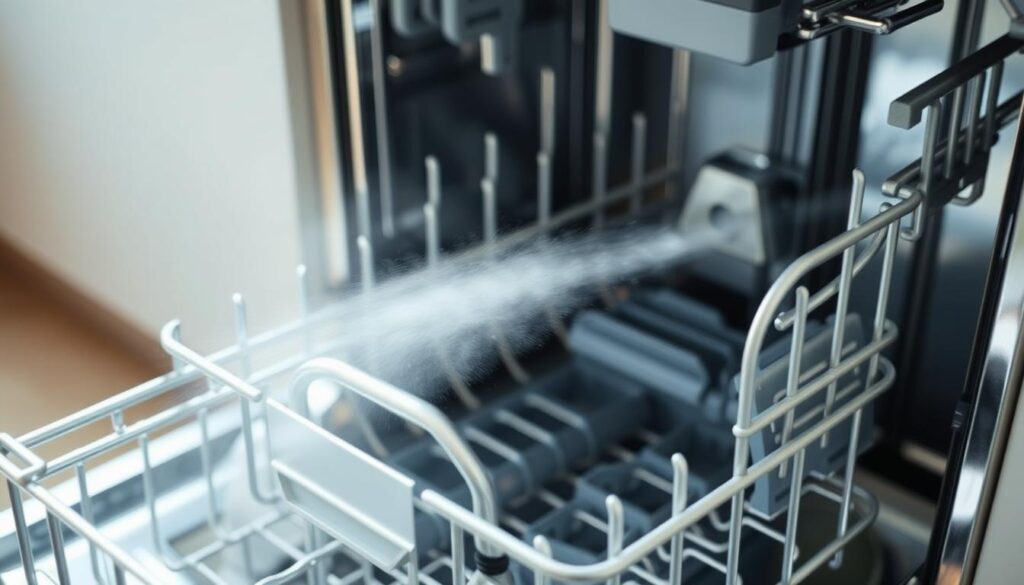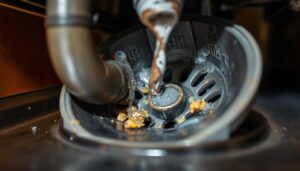Your dishwasher is a vital kitchen appliance, making after-dinner clean-up a breeze. However, if you’ve started to notice unwelcome odours emanating from it, you’re not alone. This issue can affect not just the machine’s efficiency but also your kitchen environment.
Regular cleaning and maintenance are crucial to keeping your dishwasher in optimal condition. In this guide, we’ll walk you through the steps to identify and eliminate the causes of these unpleasant smells, ensuring your appliance continues to clean your dishes effectively.
Key Takeaways
- Identify common causes of dishwasher odours, including food particle buildup and grease accumulation.
- Learn effective strategies for immediate odour removal.
- Discover long-term maintenance tips to prevent future odour buildup.
- Understand the importance of regular cleaning for your dishwasher’s performance.
- Follow step-by-step instructions to restore your dishwasher to a fresh-smelling state.
Why Your Dishwasher Develops Unpleasant Odours
Unpleasant odours emanating from your dishwasher can be both puzzling and frustrating. Understanding the root causes of this issue is crucial to resolving it.
Common Causes of Dishwasher Smells
Several factors contribute to the development of unpleasant odours in your dishwasher. These include the accumulation of food debris, grease, and other residues within the machine.
- Food particles not properly rinsed off dishes can get trapped in the filter and crevices.
- Decomposition of these particles releases bad smells and fosters bacterial growth.
How Food Particles and Grease Contribute to Odours
Food particles and grease play a significant role in the development of odours. Grease and oil from dishes create a sticky residue on the interior surfaces, trapping more debris and complicating the cleaning process.
| Cause | Effect |
|---|---|
| Food particles and grease | Creates a breeding ground for bacteria, leading to foul odours |
| Grease and oil residue | Makes cleaning more difficult and affects dishwasher performance |
| Accumulation of debris | Reduces the effectiveness of spray arms and water jets |
Over time, the combination of food particles, grease, and moisture creates an ideal environment for bacterial growth, resulting in increasingly foul odours. Regular cleaning and maintenance are essential to prevent this buildup and keep your dishwasher smelling fresh.
Essential Supplies for Tackling Dishwasher Odours
To effectively tackle unpleasant odours in your dishwasher, you’ll need a few essential tools and cleaning agents. Having the right supplies on hand will make the process of removing odour buildup much simpler and more efficient.
Natural Cleaning Agents: White Vinegar and Baking Soda
Two of the most effective natural cleaning agents for removing dishwasher odours are white vinegar and baking soda. White vinegar is a natural antibacterial agent that can help break down grease and food residue, while baking soda acts as a gentle abrasive and odour absorber. Using these eco-friendly cleaning agents ensures a safe and non-toxic cleaning process for your dishwasher.
Tools and Equipment You’ll Need
To clean your dishwasher effectively, you’ll need a few basic tools. A soft-bristled brush is essential for gently scrubbing the dishwasher filter and other components without causing damage. A sponge or microfibre cloth will help you wipe down the interior surfaces, door gasket, and exterior of your dishwasher. You’ll also need a dishwasher-safe bowl to hold white vinegar during the cleaning cycle. Additionally, an old toothbrush can be used to clean hard-to-reach areas, and a clean, dry towel is necessary for drying components after cleaning to prevent moisture buildup. For more thorough cleaning, you may also need to inspect and clean the spray arms to ensure they are not clogged.

Preparing Your Dishwasher for a Deep Clean
Before diving into the deep cleaning process, it’s essential to prepare your dishwasher properly. This involves a few crucial steps to ensure that you can effectively tackle the source of the odour.
Emptying and Initial Inspection
Start by emptying your dishwasher and pulling out the bottom dish rack. Remove the dishwasher’s filter, consulting your product manual for specific instructions, as the process can vary depending on the model. This initial step is vital for accessing the areas that need cleaning.
Locating Key Components That Need Cleaning
Next, identify the key components that require attention. Check the spray arm for clogs, ensure the drain is free from debris, and examine the door gasket The dishwasher filter, typically located at the bottom, is a primary component that needs regular cleaning to prevent odour buildup.
How to Remove Dishwasher Odour Buildup Effectively
Removing odour buildup from your dishwasher involves a combination of cleaning key components and running a specialized cycle. To start, it’s essential to understand the areas of your dishwasher that are prone to accumulating debris and grease, which contribute to unpleasant odours.
Cleaning the Filter System
The filter system is a critical area that requires regular cleaning to prevent odour buildup. To clean it, locate the filters at the bottom of your dishwasher, typically found around the spray arms. Remove any large debris and then wash the filters with warm soapy water. Rinse thoroughly before replacing them to ensure your dishwasher operates efficiently and remains odour-free.
Scrubbing the Spray Arms and Interior Walls
Spray arms and interior walls can harbour grease and food particles, leading to unpleasant odours. Use a soft brush or toothbrush to scrub away any visible debris from the spray arms. For the interior walls, a mixture of equal parts water and white vinegar on a cloth can help dissolve grease and eliminate odours. Ensure you rinse the cloth frequently to avoid spreading the grime.

Addressing the Door Seal and Gaskets
The door seal and gaskets are prone to accumulating mould and mildew, contributing to dishwasher odours. Inspect these areas for any signs of wear or debris. Clean the door seal with a mixture of water and vinegar, using a soft cloth to wipe away any mould or mildew. For more stubborn areas, a small brush can help remove debris from the crevices.
Running a Vinegar Cleaning Cycle
To deep clean your dishwasher, running a vinegar cleaning cycle is highly effective. Pour approximately 2 cups of white vinegar into a dishwasher-safe bowl and place it on the bottom rack of your empty dishwasher. Select a cycle with a hot water setting and press start. The vinegar will help neutralize odours, break down grease, and clean your dishwasher. After the cycle, leave the dishwasher door open to allow the interior to air dry completely.
| Cleaning Method | Purpose | Frequency |
|---|---|---|
| Cleaning Filter System | Remove debris and prevent clogs | Monthly |
| Scrubbing Spray Arms and Interior | Remove grease and food particles | Every 3 months |
| Cleaning Door Seal and Gaskets | Prevent mould and mildew buildup | Every 2 months |
| Running Vinegar Cycle | Deep clean and remove odours | Every 6 months |
By following these steps and maintaining a regular cleaning schedule, you can effectively remove dishwasher odour buildup and keep your appliance fresh and clean.
Tackling Stubborn Odours and Persistent Buildup
If your dishwasher still smells after a basic clean, it’s time to tackle the stubborn odours and persistent buildup. This involves a deeper cleaning process to remove any remaining grime and food particles that can cause unpleasant smells.
Using Baking Soda for Deep Cleaning
For a deeper clean, you can use baking soda. Sprinkle a cup of baking soda at the bottom of your dishwasher and run a hot water cycle. This helps to absorb any lingering odours and neutralize the environment inside your dishwasher. Baking soda is a natural cleaning agent that is effective at removing grime without damaging your appliance.
Addressing Hard Water Deposits and Limescale
Hard water can lead to limescale buildup in your dishwasher, contributing to odours and reduced performance. Vinegar is particularly effective at dissolving these mineral deposits due to its acidic properties. For severe limescale buildup, consider using a commercial dishwasher descaler. Regular use of rinse aid and dishwasher salt can also help prevent future limescale buildup and maintain your dishwasher’s optimal performance.
Monthly Maintenance to Prevent Future Odours
You can prevent your dishwasher from developing odours by following a simple maintenance routine. This involves regular checks and practices that ensure your dishwasher remains clean and fresh.
Creating a Regular Cleaning Schedule
Establishing a regular cleaning schedule is vital. Using a high-quality dishwasher detergent like Cascade Platinum Plus Action Pacs can help prevent hard water filming and keep the inside of your dishwasher looking fresh and clean. It’s recommended to clean your dishwasher at least once a month to prevent the buildup of grease and food particles.
- Scrape excess food from dishes before loading them into the dishwasher.
- Use a rinse aid to improve drying and reduce spotting on your dishes.
Best Practices for Daily Dishwasher Use
To maintain a clean and odour-free dishwasher, it’s essential to follow best practices for daily use. Ensure you load your dishwasher properly according to the manufacturer’s instructions, and avoid running other hot water appliances while it’s in use. Leaving the dishwasher door slightly ajar after cycles can also help prevent musty odours from developing. For more detailed guidance on cleaning a smelly dishwasher, you can visit this helpful resource.
- Rinse dishes with stubborn food residue before placing them in the dishwasher.
- Regularly check and clean the filter to prevent clogging.
Conclusion
By implementing a few simple habits, you can significantly reduce the likelihood of unpleasant odours in your dishwasher. Maintaining a clean, odour-free dishwasher requires consistent attention but is relatively simple once you establish a regular cleaning routine. Addressing the root causes of odour—food particles, grease buildup, and limescale—will improve your appliance’s performance. Regular filter cleaning, monthly vinegar and baking soda treatments, and proper daily usage habits will keep your dishwasher fresh. For persistent odours, consider consulting a professional as there may be underlying issues with your dishwasher’s drain system. You can find more detailed guidance on resolving issues with your dishwasher smells online.
Prevention is easier than deep cleaning, so implementing small daily habits like scraping dishes and leaving the dishwasher door ajar can save you time and effort. A clean dishwasher not only smells better but also cleans your dishes more effectively and consumes less energy.



